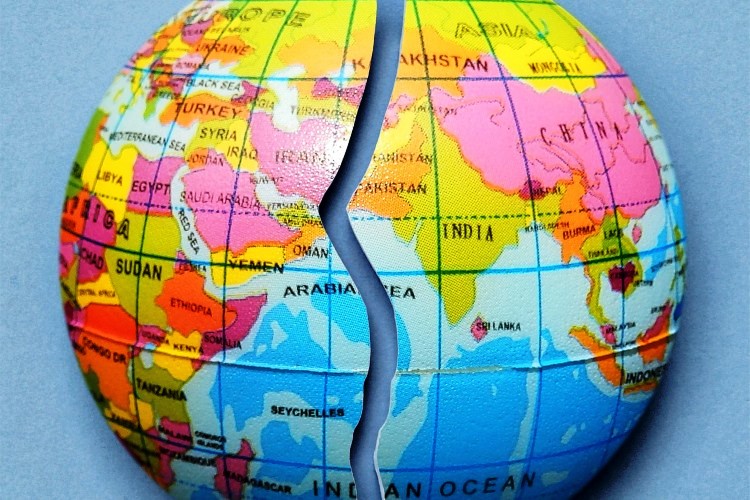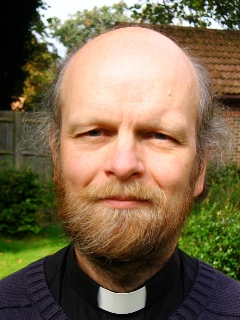We all need to coexist on planet earth
1st May 2019

Climate change protests have been very much in the news recently, but Andy Bryant argues that there is an even more fundamental issue that needs to be addressed
At long last the issue of climate change seems to be getting the attention it needs. Two weeks of protests in London has certainly bumped the issue up the headlines although it remains to be seen whether a government paralysed by Brexit will actually make any concrete response
We cannot continue to ignore the reality that, in the West, we have for too long adopted lifestyles that are unsustainable. For too long the basis of economic development has been based on exploiting the planet’s resources rather than learning to live in harmony with creation.
For too long we have lacked a real sense of urgency in our approach to climate change. We have tinkered with small changes hoping it will be enough, avoiding facing up to the extent to which we are all going to have to change our lifestyles if the impact of climate change is to be stopped, let alone reversed
Extinction Rebellion argues that there is no other issue so urgent and that this justifies the level of disruption they have been causing on the streets of London. The crisis is now, and facing up to it requires action now
Without wanting to detract from this very real sense of urgency, I nevertheless want to suggest that there is one issue which is even more urgent. An issue that has faced humanity ever since we first walked on this planet. An issue that grows ever more urgent as populations grow and communities become ever more interconnected. An issue which, if not resolved, will frustrate the best efforts at halting climate change
And the issue is this: how as human beings can we learn to live in harmony and co-operation with each other?
Our animal instinct is to exclude. The herd seeks to protect its territory, defend its food sources and its females for mating. Human society has followed the same instinct, with tribes and nations seeking to maintain borders, control migration, protect food supplies. We divide the world into those that are like us and those who are not like us. At best this leads to avoidance and suspicion and at worst it leads to oppression and war
Tragically, religion has echoed rather than challenged this divisive approach to living on this shared planet. Each faith claiming their faith is the true faith, dividing the world into those who are saved and those who are not, those who are in and those who are out. It is the belief that “God is on my side”. This is echoed in the language of evangelism and conversion.
Sadly, there are even divisions within the faith groups themselves. Although words such as welcome, inclusion and love are much spoken about, the reality is that too often religion has been for the dividing and not the healing of nations and peoples
The world of politics is similarly so often is about divide and rule. A powerful individual or group dictating the direction of a nation. The best democracies know that they must be more than dictatorship by the majority but the governments that genuinely seek consensus are few and far between. Despite the ideal of the United Nations as a forum for co-operation the structure of the Security Council ensures that the old fault lines amongst the nations are endlessly replayed
The inability of humans to live together in a spirit of mutual co-operation leads to numerous places of conflict and millions fleeing as refugees, the suffering of many in the face of oppression and millions being trapped in poverty, the murder of people in their places of worship and the persecution of people for their beliefs or political ideals
As critical as the challenges of the climate crisis may be, unless humans can discover new ways to co-exist, then the prospects of deep and lasting change seem all too unlikely
We need politicians who build bridges and promote co-operation, who reach out to learn from those who hold opposing views and who cherish shared ground and the common good. We need faith groups known for their depth of generosity, the sincerity of their welcome, the quality of their inclusion and their lack of judgement
Each day I am challenged by the words of St Benedict to treat the visitor as if they were none other than Christ himself. The truth is I would most likely have found much of what Jesus said and did rather annoying. I would have criticised his teachings and, even if not one of those shouting “crucify”, I would have been quite glad when the authorities finally got him off the streets. And yet this is the one I find who can most truly teach me the true meaning of love
If I could treat each person I met, especially those who I do not naturally warm to, those who hold contrary views to my own, those who approach life in a different way to me, as I would want to treat Jesus, then maybe, just maybe there is a chance
Extinction Rebellion is right that the crisis is now. However, unless we humans can learn to reach out to one another, break down the barriers that too easily divide us and build a new consensus across the global community, then I fear all that will be left from these current protests is not rebellion but just extinction
the image above is by Steve Watts from Pixabay.com
this article also appeared on Network Norfolk

Revd Andrew Bryant is the Canon for Mission and Pastoral Care at Norwich Cathedral. He was previously Team Rector of Portishead, Bristol, in the Diocese of Bath and Wells, and has served in parishes in the Guildford and Lichfield Dioceses, as well as working for twelve years with Kaleidoscope Theatre, a charity promoting integration through theatre for young adults with Down’s Syndrome
You can read Andrew's latest blog entry here and follow him via his Twitter account @AndyBry3
The views carried here are those of the author, not of Network Yarmouth, and are intended to stimulate constructive and good-natured debate between website users
We welcome your thoughts and comments, posted below, upon the ideas expressed here
Click here to read our forum and comment posting guidelines
|